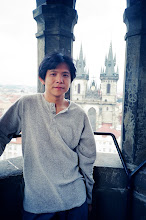
(Opera at Vienna 1994)
When we got introduced to a city, normally it is not simple like "this is Mr. Brown." In fact, the name of a foreign city is normally translated into other languages before it got translated to Chinese.
The name of Vienna in German is "Wien", which means "wind" in German. Vienna is a windy city due to its location in a large plane and that was where her name came from. The translation was taken from the word "Vienna" and most likely because we took it from English. Similar was Prague which is called Praha locally and Hungary Magyar.
The name Magyar is worth some noting as when we learned the history of Yuan Dynasty at high school, we actually learned there were Magyar people in China by the name Magyar but as Hungary was always translated by its English name, I wasn't aware of this acquaintance until I was at Hungary the first time noting this formal name. Names are somehow buried in history and second handed translation. I would bet there are more in the names of the central asian countries where we were familiar by their historical chinese names but not their modern names...
Another interesting example is Seoul demanding China and Taiwan to correct its translation in Chinese. Originally Seoul was translated as Han-city (漢城). In Chinese, it can mean city of Han people and Han people normally means Chinese. No wonder Korean people want a change. Now Seoul is named 首爾 by the pronunciation...

 Corridor of the Rathaus at Vienna
Corridor of the Rathaus at Vienna For buddist, the golden paint (sometimes genuine gold) over the budda is to show the respect to the budda himself. Here at the Stadtpark, johann Strauss is painted in gold for similar reasons.
For buddist, the golden paint (sometimes genuine gold) over the budda is to show the respect to the budda himself. Here at the Stadtpark, johann Strauss is painted in gold for similar reasons.


